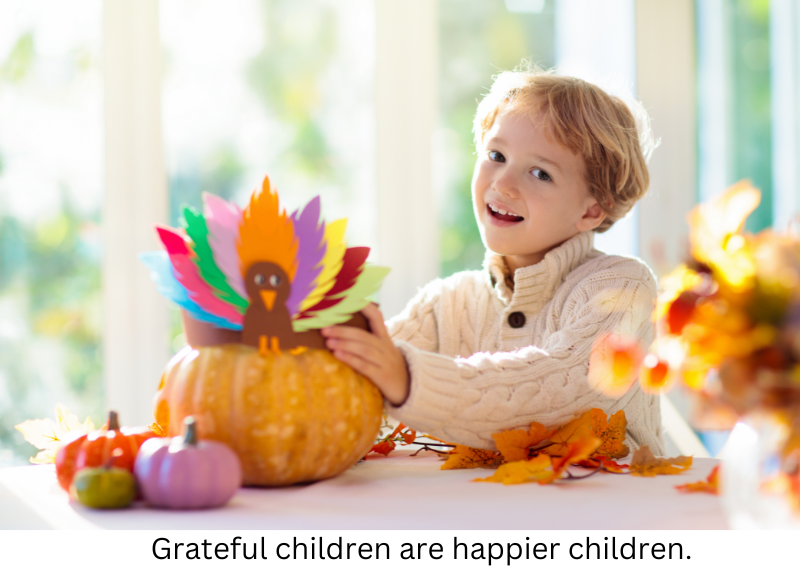“Gratitude and attitude are not challenges; they are choices.” Robert Braathe
For parents trying to help children cope with divorce–and often coping with some attitude along the way–this quote brings good perspective. Gratitude is a choice that helps children cope with divorce.
To be sure, children struggle when their family as they know it falls apart. When parents no longer live together, and it’s up to them to move between homes. When they have to answer questions from friends about changes they are going through.
It can be really hard for you to know how to help them. More–it can be hard to handle the attitude as you try to help, but seems the worst time to call them on their attitude.
Switching the focus from attitude to gratitude offers a real path for supporting children. Giving thanks actually helps children navigate divorce. More, children reap many other benefits along the way. First–the benefits.
Benefits of gratitude for children.
Most people sense that, when they pause to say thank you, they feel better and have a better outlook. It turns out that this sense is real–for adults and children. Research has discovered multiple benefits children and teens reap as they grow in gratitude.
Benefits of gratitude in children include:
- Improved mood. Giving thanks actually does improve mood. And, an improved mood leads to better attitudes. So, that attitude you’ve been experiencing from your children can be improved. But, instead of harping on their attitude, focus more on urging children to notice what they have and give thanks. Children who develop a habit of expressing their gratitude report feeling more positive emotions such as happiness and satisfaction–which all parents want for their children. This lift in emotions can even reduce symptoms of anxiety and depression–which many children of divorce experience.
- Improved sleep. When children think about things they are thankful for just before going to bed, they tend to go to sleep easier, sleep longer, and experience better quality of sleep. What parent doesn’t want that?
- Closer connections to family and friends. Research shows that grateful children tend to have more meaningful relationships. Gratitude tends to make children empathetic toward those who don’t have what they have. It also helps children see and value the positive–especially in people. All of this leads to better relationships.
- Improved self-esteem. To give thanks, children must notice and enjoy what they have. This keeps them from comparing themselves to others and focusing on what they don’t have. Instead, they become content and secure, which leads to higher self-esteem.
- Better outcomes in school. This self-esteem often feeds more active participation in school, which leads to more ability to grasp concepts and put them to use.
How to help children become more grateful.
So, given the benefits of gratitude for children, how can you help your children grow in this habit?
- Model it—Children, especially younger children, do what they see. When you tell your child, “Thank you for cleaning up your toys. That helps our home and makes my job easier,” they experience the joy of being of real help. That empowers children. As they consistently see you thank them, their teachers, the clerk at the grocery, and the neighbor—they learn thankfulness matters. And, they see how to do it.
- Join with them—Don’t just expect children to take this on—be in it with them. After Christmas, make hot chocolate, grab a stack of thank you notes, and gather around the kitchen table. You can begin a note to Grandma, then pass it to your children to add their own line. This proves much less overwhelming than “Remember to write your thank you notes.” This works for events as well. After you leave a movie, museum, or hike in the woods, ask, “What did you enjoy?” Then, take a moment to say, “We give thanks for the great jump scare or the slide down the hill.” Sure, it’s corny. But, building that pattern cements in your children the pattern of pausing, noticing, and giving thanks.
- Normalize that hard still comes. Gratitude is not a talisman against hard things. People get sick. Jobs fall through. Others let us down. Gratitude is the ability to, in the middle of something hard, ask, “What else is there?” and be grateful for the good that remains. This habit builds the resiliency to face and move through the hard things that will come.
Divorce is hard for children. And the holidays make the hard more real. Being grateful doesn’t mean squelching those feelings. They need to be expressed and processed. At the same time, teaching children to make the choice to be grateful offers them a way to see the good they still have in the midst of the hard. More, they build a habit of gratitude that brings a host of benefits for the rest of their lives.
If you would like more information on navigating divorce, contact Resolution Mediation by clicking HERE or calling 317-793-0825. We look forward to serving you.
As always, the above is for information only. Seek a divorce professional for guidance in your personal situation.


